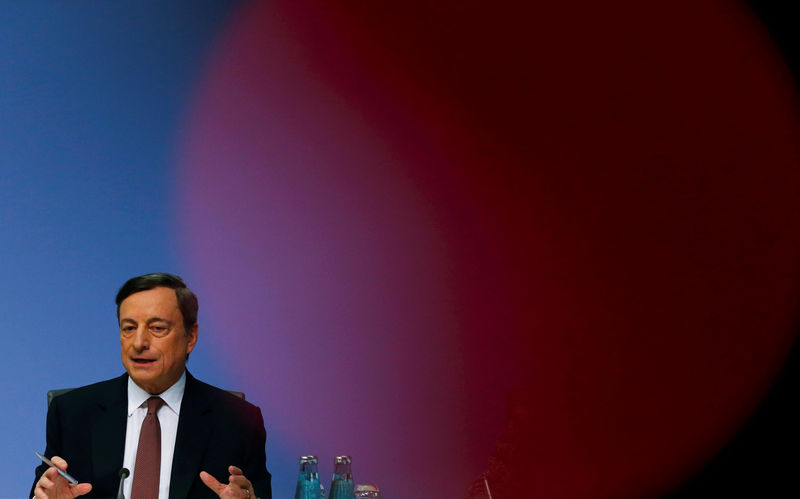By Jamie McGeever
LONDON (Reuters) - The European Central Bank and Bank of Japan may soon be spending as freely on shares as they already are on bonds, especially if the weapons so far deployed from their monetary policy arsenals continue to fire blanks.
Both central banks are already buying large quantities of bonds as part of an ultra-loose policy slate designed to kick-start inflation. But price pressures in both regions remain negligible and the euro and yen have risen against the dollar this year.
The BOJ already buys small amounts of stocks and, asked this week whether the ECB would contemplate buying equities, its vice president Vitor Constancio said only that no further measures would be adopted so soon after policy was eased in March.
Such an option would add to evidence that conventional monetary policy has long run its post-crisis course, and suggest unconventional measures may be reaching their limit too.
But with 'nuclear' easing measures such as printing 'helicopter money' to directly finance public spending by governments now also part of the debate, money managers reckon that, while inflation remains so far below target, large-scale share buying is firmly on the 'whatever it takes' menu.
Critics say owning significant quantities of shares would represent excessive risk for central banks and tread dangerously close to national ownership of domestic companies.
But Joachim Fels, managing director at bond fund giant Pimco, said the ECB could start buying equities later this year.
"Equity purchases in Europe would clearly support market sentiment and stock prices, just as the ECB announcement in March to buy corporate bonds led to a collapse in credit spreads," he said.
BUILDING IN A SHARE PRICE RALLY?
Both central banks are already big players in fixed income markets, with the bulk of the world's $8 trillion of bonds that carry negative yields being euro zone and Japanese debt. The ECB could own up to 25 percent of outstanding euro zone government bonds by the time it has finished its current plan.
But those purchases, along with rock-bottom interest rates, have failed to halt a rally in the euro and yen that has undermined the ECB and BOJ's ability to meet inflation goals of around 2 percent. The European Commission this month slashed its 2016 forecast to 0.2 percent.
Further stimulus therefore looks likely, with stocks an easily tappable asset and - if the positive impact from the banks' bond purchases on borrowing costs is any guide - one that might then experience a healthy bounce.
To minimize the risk of disrupting the market, any purchases of equities would likely be done via exchange-traded funds (ETFs).
With around 6 trillion euros in potential equities that ETFs can buy in Europe, there is ample liquidity, according to Nikolaos Panigirtzoglou at JP Morgan.
RAMPING IT UP
The Bank of Japan is already buying ETFs at an annual pace of 300 billion yen ($2.4 billion), in addition to its existing annual purchase program worth about 3 trillion yen.
The Swiss, Israeli and Hong Kong central banks have also been or are small-scale investors in stock markets, but more aggressive buying may now be called for.
Joseph Gagnon, a senior fellow at the Peterson Institute for International Economics in Washington and former Federal Reserve Board economist, argues that the BOJ needs "bold initiative rather than renewed paralysis."
This could mean ramping up purchases of Japanese stocks to 10 percent of the outstanding total, or about 50 trillion yen, from around 0.5 percent currently.
Such a move would contribute to "pushing up equity prices and encouraging consumption and investment through higher household wealth and lower cost of capital," he wrote in a blog earlier this month.
As nothing on that scale appears imminent in Europe, it may be Tokyo that leads the way.
"If the BOJ expands its ETF purchasing plan in June or July, then that could be the trigger for the ECB to look more closely at this," said JP Morgan's Panigirtzoglou.
Purchasing stocks would also go some way to supporting bank valuations, which have been hammered in recent months by the low and negative yields and a dismal first quarter trading environment (SX7P) <.TRXFLDJPPBANK>.

And even 'equity QE' skeptics would be hard pressed to argue against the importance of a vibrant and healthy banking system for getting credit flowing through the economy and lifting inflation.